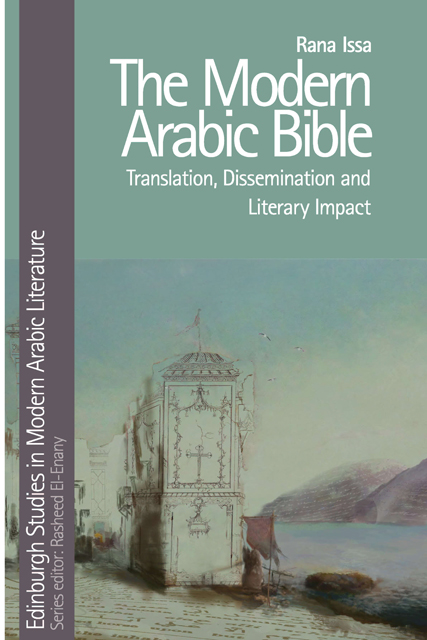Book contents
- Frontmatter
- Contents
- List of Figures
- Series Editor’s Foreword
- Acknowledgements
- Note on Transliteration and Abbreviations
- Dedication
- Introduction
- 1 The Missionary Bible
- 2 Bible Competition
- 3 Standardising Arabic
- 4 Butrus al-Bustani as Translator
- 5 Ahmad Faris Al-Shidyaq’s Bible as Literature
- Conclusion: In the Beginning was Translation
- Bibliography
- Index
3 - Standardising Arabic
Published online by Cambridge University Press: 02 June 2023
- Frontmatter
- Contents
- List of Figures
- Series Editor’s Foreword
- Acknowledgements
- Note on Transliteration and Abbreviations
- Dedication
- Introduction
- 1 The Missionary Bible
- 2 Bible Competition
- 3 Standardising Arabic
- 4 Butrus al-Bustani as Translator
- 5 Ahmad Faris Al-Shidyaq’s Bible as Literature
- Conclusion: In the Beginning was Translation
- Bibliography
- Index
Summary
My teacher, Sheik Asaad, was a Maronite, and formerly a student in Ain Waraka. He has been much with the Patriarch, at Canobin, and is one of the most intelligent men I have met with on Mount Lebanon. He was with me from morning til night, and hours were spent by us every day in discussing religious subjects.
One day, after a long discussion with him about the Roman Catholic and the Protestant churches, he took up a New Testament, written in Carshun and Syriac, and opening it said, ‘The first passage I cast my eye upon shall be for the English.’ The chapter to which he happened to open, was Luke 1 and he read, beginning at the top of the page, as follows; ‘the word; it seemed good to me also, having had perfect understanding of all things from the very first, to write unto thee, most excellent Theophilus; that thou mightest know the certainty of those things wherein thou hast been instructed.’
He seemed to be struck with the passage, as the first word was ‘the word,’ and remarked, that it was very appropriate, as we distributed the word.
Then closing the book, he said, ‘Now I will open it, and the first passage shall be for the Pope.’
On opening, the first word that met his eye was ‘Unclean,’ and he read as follows; ‘the unclean is gone out of a man, he walketh through dry places, seeking rest; and finding none, he saith, I will return unto my house, whence I came out. And when he cometh, he findeth it swept and garnished. Then goeth he, and taketh to him seven other spirits, more wicked than himself, and they enter in, and dwell there, and the last state of that man is worse than the first.’ (Luke 6. 24–6).
This is an account by Jonas King to the periodical The Missionary Herald about the conversion of As‘ad al-Shidyaq. As‘ad, brother of Ahmad Faris al-Shidyaq, was the first Arab convert and martyr to Protestantism. In this scene we encounter him performing an istikhara: a practice of scriptural reading that seeks to intuit the future.
- Type
- Chapter
- Information
- The Modern Arabic BibleTranslation, Dissemination and Literary Impact, pp. 109 - 148Publisher: Edinburgh University PressPrint publication year: 2023

